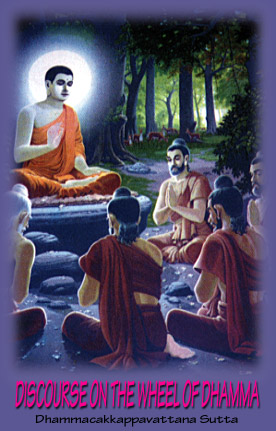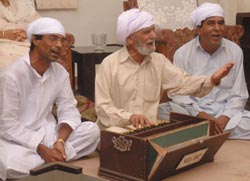
Dear Ko Moe,
What I am arguing is when you are at the second level of epistemology, I think insight into the third level is not that very far for a mature western social scientist who has been thoroughly searching himself and the purpose of life. As I enlightened the third non-dual awareness in meditation at the Shwe Dagon Pagoda, anybody who takes the shade of a tree or a quiet place can also enlighten in the same way because we can never underestimate the unleashed potential and infinite prospect of human beings.
Let's do it in logic. It has been so long straddling years to be believed that no Pyitt Sa Ka Bodhi enlightenment can appear during the live period of Buddha’s Sarsana. If this saying had been true, any enlightenment must have been derived exclusively pure from the teaching of Buddha. But if you review Tripitika, the eight jana practices are that of Hinduism and Buddha always encouraged people to practice these steps. Apparently as he was not the founder of Hinduism, he was a person who could merely encourage these practices that have been established over thousands of years before his enlightenment. In this sense, for many of the people, these practices are unavoidable stepping stones to Nirvana Enlightenment. When you complete the Eighth step of Hindu janas, the one you need is just to drop off your identity. According to my memory, there are also very few western philosophers who deny the existence of I. As if a tailor who has a very good eye in sewing could seam different portraits to be enlivened on a single backdrop, a Hindu philosopher who accepted the non-existence of I, being zealous in finding himself by his traditional religious jana practices will also get the enlightenment of Nirvana in Buddhism.
Assuming this hypothetical case. a Hindu philosopher who suspects the existence of I can practice these Jana steps and can ultimately get insight into enlightenment of emptiness. I would also like to suggest you to understand first the interconnectedness of Sila, Samadhi and Pynnya, three attributes for self-development in Theravada Buddhism.
The simple and conventional wisdom will interpret these three great pillars as morality, concentration and wisdom. My unconventional thinking will be helpful for completeness in understanding the chain reaction of these tripod elements.
(1) Sila = mind as free from defilement
(2) Samadi = justice not to be biased +
(3) Pynn Nya = Right Analytical Power.
Maybe you find it awful to new view in interpretation of Sila, Samadi and Pynn Nya. What I feel is when I become older, I get more sense of what Buddha actually mean by his Pali words. You can see without No.(2), No.(3)can't appear by luck. The Buddhist monks seem to be still confused Pynn Nya with enlightenment and Samadi with the last step of Magga Truth, Sama Samadi that is an end for the eightfold steps and also a mean to Nirvana but not the prerequisite like Samadi, an equilibrium state of mind to get to the right analytical power of wisdom. The rightfulness of the direction is the most critical part to push you on the way of Magga Truth. No matter, how intelligent and assertive you are in cleaning the jungle, if you are cleaning the wrong jungle, this is a waste of time.
My standing is to see these 3 marble stones as pre-requirements of a lay man (Puthujana). Samadi as the second pillar of three attributes of self-development (pre-requirements) can't be the ultimate Upika to shake off everything at the doorstep of the Nirvana. Remember that the ten perfection practices of Buddha are like institutional fulfillment for the gaps of the former by the latter for the former’s incoherency in the direction of a Bodhisattva's path. I think the term Bodhisattva is also more appropriate in this respect because ten perfection practices are not to be exclusively fulfilled by Buddha and belong to all the worldly creatures who are searching for enlightenment of himself and others.
Continue analyzing. Number(2) also can't appear by luck by number(1) because free from defilement means the pain that makes your mind regressed by fear (Baya Agati)and also free from the pleasure that makes your mind regressed by love and happiness (Sandar Agati). It is a deep insight to elaborate why Buddha stressed Sila very much because Sila itself is the start of this middle way. (Please keep all these emails because when our rotten bodies get older, maybe I can't produce them again: that is why Buddha said the basic of men's prosperity is a good friend. Without the help of a good friend at the level of this philosophy, I can't get insight by my intrinsic capacity: You know the whales is happy only in the Great Ocean) And some Mahayanists who can't think enough the real philosophy of Sila try to justify pleasure practices (I remember what you said by tasting sexual practices to find the enlightenment, I don't remember the names of these branches) if you merely have the enough right view and great compassion to save the world.
If you can see the series of Sila, Samdhi and Pynn Nya, you can easily conclude this
tripartite can't be excluded from each other. I suggest that the referred Mahayanists can't get this merely right view without pre-fulfillment of the justice equilibrium.
It may probably be very difficult to get this insight of morality and justification because even Ven. Janaka Bivonta said it is his first priority to urge people to have a good heart. This may be true in the way for dealing and enduring the problems of society but not in the way to Nirvana at the spiritual level of our struggle for liberation. If we say a good heart as the initial key to everything, our religion is not different from Jesus and Mohammed because they also have superbly good hearts for the people.
You can also see compassion as the pleasure and wisdom as pain. Because it is very painful to get a better level of wisdom because you always have to quarrel with the pre-existing dog in your body (remember Philosopher Shwe Mya Ta of Min Thein Kha).
You will probably be surprised to see that when pleasure is trying to accept everything, wisdom is trying to reject everything. And Buddha said there is a middle way and for which Sila is a pre-requriement and Samadhi is the initial entry level into the right view that is the supra-pynn nya derived from your rightly directed analytical power based on samadi (equilibrium of non-biasedness). That is why Buddha never says Sama Sila among the steps of the eightfold pathway because Sila is the pre-requirement and not a constituent on the way to nirvana. The monks are confused by interpreting Sama Vasa,Sama Kammana and Sama Arjiva as the Sama Sila and try to adulterate these inalienable eight "processing" steps as being identical with 3 "pre-requirements".
Let's continue the hypothetical case. If we assume just non-identity and no difference as the way to see the emptiness, we can easily see that this Hindu Philosopher who has already enlightened the nirvana can still think that this is still not the nirvana and this nirvana is still just an illusion created by Saturn to diversify him. He will further seek to combine with God he trust and this becomes his decisive real enlightenment. That is why, nothing in the universe is apparently one of the highest steps and manifestations of matter the God create is the ultimate step in Hinduism. By this hypothetical case, I will frankly like to alert both Theravadist and Mahayanists for the fact that the Annattha principle in imperfect epistemic catching of an enthusiastic practitioner could be a just a jana step in Hinduism. Quite paradoxical and ironical, we try to practice Buddha’s meditation but unfortunately we used to end with a makeshift enlightenment of Hinduism.
Apparently the practitioner in Hinduism is rather easy to be adept in swapping to and fro from non-identity to diversity (Nothing in the universe to everything in the universe), (worm's eye to bird’s eye) than much more subtle and seemingly untouchable Vipassana practitioner. According to Buddha, these enlightenments in Hinduism are very good but so far not great enough to be acclaimed as ultimate truth because you can't reach the real emptiness by seeing emptiness as nothing is in the universe.
Let's see my logic again. If non-identity and no difference is the right view, we have to accept that a Hindu, a Christian or Siddartha can reach the emptiness we refer in our epistemology. But if non-identity is still not the right view, we can hold that only in our Magga way, we can get enlightenment. Because the middle way referred by Buddha for justification is "never ever" present in any philosophy or any religion. Some Christians or Muslim scholars can argue Buddhists easily that they are also non-identity religions because they believe nothing exists other than the One. I think this logic and example is enough to prove that the middle way is more important than Anatta principle that both Mahayanists and Theravadists assume themselves as the best and only invincible the One philosophy in the world.
Trying for unbiased justification,
Burmakin





